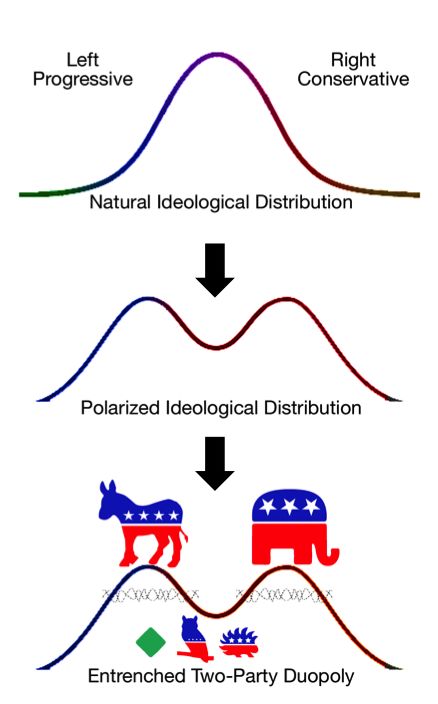Why Does The U.S. Have Just One Party More Than China?

Q: Why does the US have just one party more than China?
A. Access barriers to ballots and debates?
B. Big Money in politics?
C. Collusion between the two major parties?
D. Duverger's Law?
All of the above may be true, but the root cause of the two-party system is Duverger’s Law. Nowhere does the US Constitution say we must have a two-party system—two dominant parties result from our primitive choose-one plurality voting method. Similar candidates would split the vote, so parties consolidate into two, left and right of center. These two dominant parties then entrench themselves with ballot-access barriers, making third parties not merely weak, but completely unviable and irrelevant. This result is known as Duverger's Law (Doo-ver-zhay). Fortunately, since voting methods are not specified federally, reforms can be introduced at the state or local level.
There will be no viable third party in the US until the voting system is changed. What should the voting system be?
The simplest solution is Approval Voting: Vote for as many as you like
Approval Voting uses today’s ballots, without the limit of voting for only one candidate. This small change eliminates the “wasted-vote” dilemma, where voters must decide between their true favorite and an “electable” frontrunner. Does expressing an opinion on multiple candidates violate the old “One man, one vote” principle? Not at all, but the principle needs updating: One voter, one ballot.
Approval Voting is a simple solution with huge benefits:
- Consensus winners with maximum approval—broad appeal instead of polarizers
- Viable third parties, with visibility reflecting their true support
- No more vote splitting: lesser-known candidates do not risk being spoilers, like Ralph Nader was in the 2000 election.
- Less negative campaigning: similar candidates do not fight over votes from the same constituency
Approval Voting is the simplest version of Score Voting, where you rate the candidates on a scale, e.g. 0 to 5. Approval Voting is 0 or 1, thumbs up or down. If you want more expressiveness, you have an upgrade path: just increase the scale, e.g. 0–2. Score Voting in any variation produces the fairest results of any voting system.
Approval Voting is a better way to vote in all spheres of human interaction, not just politics, let alone just in general elections. It works for friends choosing a restaurant, businesses making a purchasing decision, and deliberative assemblies considering multiple options. Approval Voting would help the major parties pick stronger nominees in the primary elections, avoid negative campaigning, and improve post-primary party unity. With so much upside, practically no drawbacks, and an easy transition, there is no reason not to take advantage of Approval Voting today.
Editor's Note: This column originally published on The Center for Election Science's blog, and has been modified slightly for publication on IVN.
Photo Credit: dalebor / shutterstock.com




